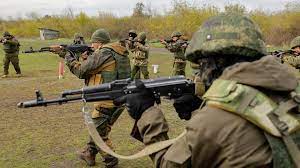In a shooting incident on Saturday, at least 11 Russian soldiers were killed, highlighting the difficulties posed by Russian President Vladimir Putin’s hurried mobilization. At the same time, Ukrainian forces pressed an offensive to retake the southern regions of the country that Moscow had forcibly annexed.
When two men opened fire on volunteer troops during a target practice exercise in western Russia, the Russian Defense Ministry reported that 11 of them were killed and 15 others were injured before the shooters themselves were also slain. The ministry referred to it as an act of terrorism.
Since the beginning of the southern counteroffensive by the armed forces of Ukraine, nearly seven weeks ago, Russia has lost land. Since Russia’s invasion of Ukraine on February 24, the Kremlin is thought to have carried out this week’s largest coordinated air and missile strikes on Ukraine’s major infrastructure.
A missile assault on Saturday severely damaged a crucial electricity facility in the capital region of Ukraine as part of those attacks, according to the nation’s grid operator. As a result of increasing setbacks, the Russian military has been attempting to shut off water and electricity to remote populated regions while thwarting Ukrainian counterattacks in the controlled territory.
Gov. Oleksandr Starukh claimed that the Russian military carried out attacks in the Zaporizhzhia region using long-range S-300 missiles and Iranian suicide drones. According to some observers, the Russian military’s reliance on surface-to-air missiles may be a result of a dearth of precision weapons designed specifically for attacking ground targets.
When the recognizable explosions began at 5.15 am on Saturday, Dmytro Pocishchuk, a hospital medic in the Zaporizhzhia region’s capital who has recently treated hundreds of people hurt during Russian attacks, said many sought protection outside or in the basement of his building.
“These airstrikes and atrocities will continue if Ukraine ceases. Pocishchuk stated a few hours later, “We can’t give in to the Russian Federation. He placed a small Ukrainian flag on his severely damaged car’s cracked windscreen.
Oleksiy Kuleba, the governor of the Kyiv area, said that no one was killed or injured when a missile struck a power plant early on Saturday. The facility, one of many infrastructure targets the Russian military attempted to destroy after a truck bomb explosion on October 8 damaged the bridge connecting Russia to the Crimean Peninsula, was not named by Ukrainian officials due to security reasons.
Repair teams were trying to restore the electricity supply, according to Ukrainian electricity transmission provider Ukrenergo, although the organization issued a warning to the public about potential future disruptions. The deputy director of the Ukrainian president’s office, Kyrylo Tymoshenko, asked people in the nation’s capital and three nearby regions to practice energy conservation.
Ian Williams, a fellow at the Center for Strategic and International Studies, a Washington-based policy institute, said that Putin “may hope that by deepening the suffering of the Ukrainian people, President Volodymyr Zelensky may be more inclined to negotiate a settlement that allows Russia to retain some stolen territory in the east or Crimea.”
“A simple look at history demonstrates that targeting civilians for strategic bombing is a futile attempt to advance political objectives.”
Numerous people were murdered in this week’s extensive retaliation attacks, which included the employment of Iranian self-destructing explosive drones. Strikes in Kyiv, Lviv in western Ukraine, and other cities that had witnessed relatively few strikes recently struck residential structures as well as infrastructure, such as power plants.
Putin stated on Friday that while Moscow did not see the necessity for further large-scale attacks, his military will undertake targeted ones. He claimed that seven of the 29 targets the Russian military intended to destroy this week weren’t damaged and will be eliminated gradually.
According to the Washington-based Institute for the Study of War, Putin’s comments were made to respond to pro-war Russian bloggers who “generally supported the beginning of bombings against Ukrainian cities, but warned that a short campaign would be unsuccessful.”

















